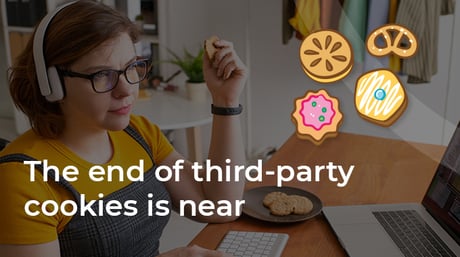-
Written by Christopher Van Mossevelde
Head of Content at Funnel, Chris has 20+ years of experience in marketing and communications.
3d party cookies are going away. Prepare your marketing for it!
What's all this fuss over cookies? And why are third-party cookies going away? In this blog post, we'll answer those questions and more.
Why all the fuss over third-party cookies?
With the help of third-party cookies, digital advertisers can:
-
Track your cross-site activity
-
Retarget you with ads based on what you search for or based on your interests
-
Serve new targeted ads based on any consumer insights and ad performance data they collect
The possibility to target consumers with such precision, however, has come under increased scrutiny. Many consumers find these ads intrusive and demand the right to privacy. Governments and regulators have also listened and have enacted laws to crack down on any privacy infringements. All of this has created both challenges and opportunities for digital advertisers.
Watch our short video about first, second and third party cookies.
Europe's highest court ruled back in 2019 that active consent is needed for tracking cookies. And with GDPR being enforced across the continent, consent became a requirement for organizations before storing or accessing non-essential data.
Following suit, Google said it would phase out third-party cookies over the next two years. And Apple said it would limit the use of its mobile device ID, Identifier for Advertisers (IDFA), in the iOS apps. With these moves, the two goliaths shook the digital advertising world.
Now, Google’s Chrome browser isn't the first to phase out third-party cookies, but it’s certainly the biggest. (Browsers like Safari and Firefox already blocked third-party cookies back in 2013.)
Yet with Chrome taking these steps, the future of third-party cookies is now under fire.
%20(1).png?width=1104&name=adtriba-promor%20(1)%20(1).png)
How will this impact online advertising?
Google has talked about developing a "Privacy Sandbox." A tool that could allow marketers to continue to target consumers with suitable ads without having access to the same level of data. Google's approach is to move all user data into Chrome to store and process it.
With third-party cookies phasing out on Chrome, marketers are questioning Google's motivations. Marketers will still target consumers using Google Ads, powered by Chrome's first-party cookies and Privacy Sandbox tools. Yet, for other ad software and platforms that rely on third-party data, they'll take a blow.
On top of Privacy Sandbox, Google is developing other tools to track groups of people instead of individuals. One such investment is called FLoC. It, in turn, will lead to further innovations to help companies leverage their first-party data and revitalize contextual advertising, which lets you circulate PPC ads on websites that rank for similar keywords.
With Google getting rid of third-party cookies and Apple’s iOS 14.5 update, this duopoly is creating its own walled gardens. According to Epsilon, Google and Apple will benefit primarily because their "direct customer relationship will keep them relatively unaffected." Epsilon also found that 62% of marketers believe consumers won't benefit from this change after all.
Whether or not consumers will be better off when third-party cookies go away, only time will tell. One thing is for sure, the demand for consumer privacy isn't going away. It’s now time for companies to foster closer relationships with their customers. And relying much more on first-party data is the answer.
Key takeaways
1. Continue to build strong relationships with your customers from the data you own.
2. Find out what first-party data you’re collecting today, and what data you’ll need to strengthen customer relations.
3. Ensure the data you collect benefits your customer, that you’ve got active consent, and that your safeguard their data and privacy.
4. Leverage first-party data to create personalized and highly targeted customer experiences. Examples of this could be welcoming a customer to your website, giving them recommended products and services based on their shown interest, and sending them a cart abandonment reminder, among other things.
-
Written by Christopher Van Mossevelde
Head of Content at Funnel, Chris has 20+ years of experience in marketing and communications.
